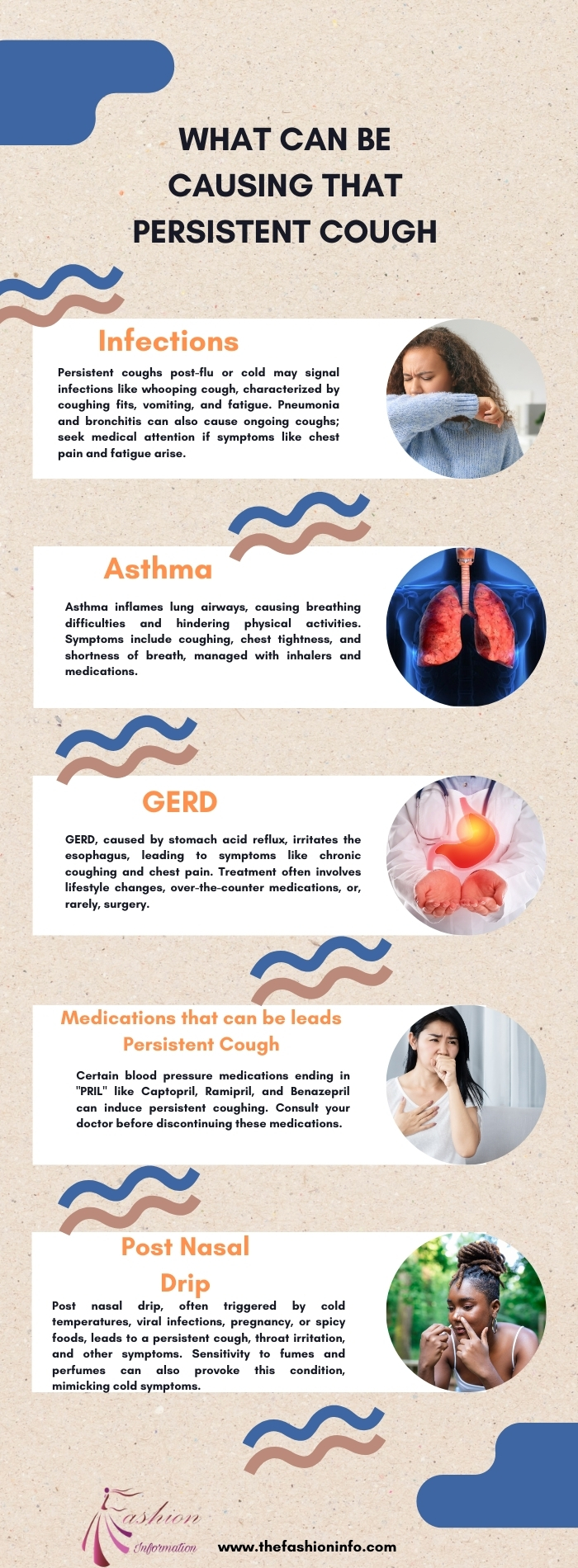Table of Contents
Introduction
Mainly the reasons to cause Persistent Cough are:
1. Infections 2. Asthma 3.GERD 4.Medications 5.Post Nasal Drip
1. Infections
There are a number of infections that can cause a cough to be persistent. Even if you have just gotten over the flu or a cold, your cough may not go away if you have an infection.
Whooping cough (pertussis) is an infection that affects that respiratory tract. In turn, it can cause chronic cough. Anyone, regardless of age or gender, can develop whooping cough. Asides from coughing fits, other symptoms of whooping cough includes throwing up after or during coughing episodes. Feeling extremely tired after a coughing fit is also a symptom.
Antibiotics are typically given to those with whooping cough, but only in the early stages. If the cough doesn’t go away after 8-12 weeks, then you should see a doctor.
Pneumonia and bronchitis are two more infections that can cause an ongoing cough. Both conditions can become very serious, so it’s important to see a doctor if you suspect you have either. Symptoms to look out for (for both) include chest pains, feeling like there’s liquid built up in your lungs, tiredness, and of course coughing.
2. Asthma – Persistent Cough
Asthma is a condition that affects the airways to the lungs. It’s an inflammatory disease that makes breathing hard, and it can make performing physical activities challenging. For some people, asthma prevents them from doing physical activities due to the constant coughing fits it can cause. If you have a persistent cough that has gradually gotten worse over time, then you might have asthma.
Symptoms of asthma includes coughing, especially when you’re laughing or while exercising. Other symptoms include tightness in the chest, anxiety/panic and shortness of breath.
Treatments for asthma typically includes medications that are formulated to control it. One of the most common ways people get their asthma under control is via an inhaler.
3. GERD
GERD, short for Gastroesophageal reflux disease, is when acid from your stomach glows back up the tube that connect your stomach and mouth. This can cause the lining of your esophagus to become irritated. GERD is mild, moderate or severe acid reflux that can occur anywhere from twice per week to once or more per week.
Chronic coughing is not the only symptom you may experience if you have GERD. Others include mild to severe chest pain, heartburn after eating, feeling like there is a lump in your throat and difficulties swallowing.
Generally speaking, GERD is usually easy to treat. In some cases, lifestyle changes can ease the coughing and other symptoms. However, you may need to take over-the-counter medications. In rare cases, prescriptions may be required or surgery.
4. Medications that can be leads Persistent Cough
Certain medications can cause a persistent cough. In particularly, medications that lower blood pressure cause some people to develop a cough that doesn’t go away. Medications that end in PRIL are the most common types that cause chronic coughs. A few examples include Captopril, Ramipril and Benazepril. If you take any of those medications, then you need to speak with your doctor to see if it’s alright to stop using them.
5. Post Nasal Drip
A very common cause of persistent coughs is a post nasal drip. This happens when excessive mucus is produced and it is much thicker than normal. The mucus runs down the throat and nose.
Symptoms include a persistent cough that seems worse in the evening, the urge to constantly swallow or to clear your throat. Other symptoms include feeling nauseous, a scratchy throat, sore throat and/or bad breath.
Post nasal drip causes and treatments vary. A few causes include:
. Cold Temperatures- If the temperatures are cold indoors and/or outdoors, then a post nasal drip can develop.
. Viral Infections- The cold and flu can be caused by viral infections, which in turn can lead to a persistent cough.
. Pregnancy- A woman’s body undergoes various changes during stages of pregnancy, and as a result a post nasal drip can occur.
. Spicy Foods- If you eat spicy foods regularly, regardless if it’s mild or not, then you could end up with a post nasal drip.
Fumes and perfumes are common causes of post nasal drips. A lot of people aren’t aware that they could be sensitive to perfumes, fumes and/or other things that give off a scent, such as incenses. In turn, their sinuses and noses can become agitated. If you develop a post nasal drip after inhaling fumes and/or perfumes, then you could feel like you are developing a cold; And this means experiencing symptoms similar to cold symptoms.
Less Common Causes – Persistent Cough
There are less common and rare causes of a continuing cough. A few of these include:
. Cystic Fibrosis- This condition is serious and it can cause mucus can buildup in the airways and within the lungs. In turn, a chronic cough can develop.
. Heart Disease- Symptoms of heart failure and/or heart disease is shortness of breath, and in some cases excessive coughing. When this happens, it’s often referred to as a heart cough. If someone has heart disease and they lay flat on their back, then they may experience a coughing fit.
. Lung Cancer- It is very rare, but lung cancer can cause a cough that doesn’t go away. Besides coughing, those who have lung cancer may notice blood in the mucus they cough up and/or moderate-to-severe chest pain as they cough.
. Sarcoidosis- If you have this condition, which is an inflammatory disorder, then small growths may develop on areas of your skin, within the lungs, eyes and lymph nodes. The disorder can cause a host of symptoms, including persistent coughing.
There are many potential causes of an ongoing cough, but the above are among the most common.
Infographic: What Can Be Causing That Persistent Cough


